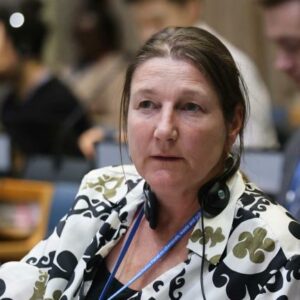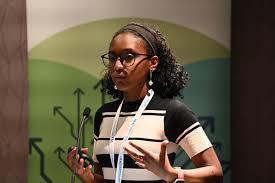Événement Virtuel
Road to OEWG 3 | The Capacity-Building Function of the Science-Policy Panel on Chemicals, Waste and Pollution Prevention: Lessons Learned from Existing Science-Policy Interfaces and Sharing of Views (AM)

11 Avr 2024
10:00–11:30
Lieu: Online | Webex
Organisation: Groupe de travail spécial à composition non limitée chargé d’examiner la création d’un groupe d’experts sur l’interface science-politiques au service de la gestion rationnelle des produits chimiques et des déchets et de la prévention de la pollution, Geneva Environment Network
This online event is part of the "Road to OEWG 3 Series", co-organized by the Secretariat of the OEWG on a Science-Policy Panel to Contribute Further to the Sound Management of Chemicals and Waste and to Prevent Pollution and the Geneva Environment Network. The event aims at showcasing possible ways to implement the capacity-building function of the Panel. This event will have two sessions to accommodate participants in different timezones, a morning session (10:00 CEST/11:00 EAT), and an afternoon session (14:00 CEST/15:00 EAT).

About this Session
The ad hoc open-ended working group (OEWG) at its second session requested the secretariat to prepare, in consultation with the Bureau, a webinar on the capacity-building function of the panel, and submit a summary of the views expressed for the information of the OEWG at its third session. This webinar aims to showcase possible ways to implement the capacity-building function of the Panel by highlighting the broader landscape in which capacity-building will take place and by presenting how other Science-Policy Interfaces implement their capacity-building functions. It also aims to encourage an exchange of questions and views amongst participants.
At OEWG 3, Governments may wish to agree on the text of the capacity-building function of the Panel.
Two textual proposals on the capacity-building function have been put forward during OEWG 2, in section A “Scope, objective and functions of the Panel”, paragraph 1 (e) (UNEP/SPP-CWP/OEWG.2/8):
- Proposal 1 (Group of African States and GRULAC): Provide capacity-building through all the functions of the panel and facilitate technology transfer, in particular to developing countries, to improve the science-policy interface at appropriate levels, including activities to ensure effective, geographically balanced and gender-responsive participation of scientists in the assessments of the panel, strengthen data generation capacity, enhance knowledge and skills that will support country infrastructure and human capacity, and facilitate connection and matchmaking of capacity-related needs and potential solutions.
- Proposal 2 (European Union): Build capacity to support the functions and work of the panel in order to strengthen the science-policy interface for sound management of chemicals and waste and to prevent pollution.
The secretariat collected views on the capacity-building function of the Panel prior to and during the webinar, structured around three key questions:
- What should be the focus of priority capacity-building activities for the Panel to undertake?
- How can we avoid overlap and duplication of work?
- How can coordination and cooperation be promoted with relevant multilateral agreements, other international instruments and intergovernmental bodies, and others?
Road to OEWG 3 Series
In March 2022, the United Nations Environment Assembly at its resumed fifth session (UNEA-5.2) agreed to establish an independent, intergovernmental science-policy panel to contribute further to the sound management of chemicals and waste and to prevent pollution. An ad hoc open-ended working group (OEWG) process has been initiated to prepare proposals for the panel.
As set out in UNEA resolution 5/8, the panel will support countries to take action on chemicals, waste and pollution, including to implement various international instruments such as multilateral environmental agreements (MEAs), by providing policy-relevant scientific advice. The Panel will also further support relevant MEAs, other international instruments and intergovernmental bodies, and other relevant stakeholders in their work.
The OEWG concluded its second session in December 2023 in Nairobi, and will hold its third session in June 2024, in Geneva.
In preparation for the third session, the Road to OEWG 3 | Science-Policy Panel to Contribute Further to the Sound Management of Chemicals and Waste and to Prevent Pollution webinar and event series, co-organized by the OEWG Secretariat and Geneva Environment Network aims to build bridges between and among stakeholders, and promote collaboration and knowledge sharing in preparation for OEWG 3, taking place in Geneva, in June 2024.
Speakers

Alexandru ROZNOV
Counsellor Assistant, General Directorate Waste and Contaminated Sites, Chemicals Unit; Ministry of Environment, Waters and Forests, Romania | OEWG Bureau Member

Tessa GOVERSE
Head, Secretariat of the OEWG on a Science-Policy Panel on Chemicals, Waste and Prevention of Pollution

Zhanyun WANG
Secretariat of the OEWG on a Science-Policy Panel on Chemicals, Waste and Prevention of Pollution

Ingunn STORRØ
Head, Technical Support Unit in Charge of Capacity-Building, IPBES

Maysoun MUSTAFA
Nexus Assessment-Fellow, IPBES
Highlights
Summary
Introduction
Alexandru ROZNOV | Counsellor Assistant, General Directorate Waste and Contaminated Sites, Chemicals Unit; Ministry of Environment, Waters and Forests, Romania | OEWG Bureau Member
- If you are here today, it is because you are fully aware that the ecological crisis our planet is currently facing does not limit itself to climate change and biodiversity loss, but that pollution is also a major concern that we need to tackle rapidly and with high ambition.
- To do so, we need to make sure that the voices of scientists are heard, and that, in return, actors and policy-makers can use the best available science to guide their decisions. This is why the work of the Science-Policy Panel on Chemicals, Waste and Pollution Prevention is so important, and therefore why we need to ensure to take the right decisions at the next OEWG in June in Geneva, when concluding our work.
- One of the important topics that will be discussed in June concerns the future capacity-building function of the Panel.
- Capacity-building is indeed a central function to ensure the adequate participation of representatives from all parts of the world, as well as to facilitate the uptake of the results that will be put forward by scientists into policies and action.
- For this reason, during the resumed first session of the Open-ended Working Group (OEWG 1.2), Government Representatives agreed that, regarding the principal functions of the new panel, the four functions as adopted in Environment Assembly resolution 5/8 should be included and that a fifth function, on capacity-building, would be added.
- At OEWG2, in December 2023, Government representatives also agreed that further discussions were needed to finalize this function. They therefore requested the secretariat to prepare, in consultation with the Bureau, a webinar on the capacity-building function of the Panel, and to submit, following this webinar, a summary of the views expressed for the information of the OEWG at its third session.
- This webinar aims at sharing views and broadening our common understanding, we will take questions and remarks from Government representatives, observers as well as stakeholders in the order in which they appear on the screen.
- Finally, OEWG2 requested the secretariat to provide a summary of the views expressed during the webinar for consideration at OEWG3. The discussion will serve as a basis for an information document for OEWG3.
Ongoing discussions on the capacity-building function of the Panel
Tessa GOVERSE | Head, Secretariat of the OEWG on a Science-Policy Panel on Chemicals, Waste and Prevention of Pollution
- The overall objective of the Science-Policy Panel is to strengthen the science-policy interface to contribute to the sound management of chemicals and waste and to prevent pollution for the protection of human health and the environment through five functions

- One of the important ongoing discussions for the preparation of the SPP is the definition of the capacity-building function of the Panel.
- At OEWG2, the ecretariat was requested to prepare, in consultation with the Bureau, timely webinars on the capacity-building function of the panel, and submit a summary of the views expressed for the information of the ad hoc open-ended working group at its third session
- This webinar is a direct response to this request and it is timely as next month a series of regional meetings will take place in preparation for OEWG-3.
- At OEWG3, Governments may wish to agree on text on the capacity-building function of the panel.
- During OEWG2, two textual proposals have been put forward, in the preamble of the draft text for proposals to establish a science-policy panel.
- This text will be put forward for consideration in document UNEP/SPP-CWP/OEWG.3/2, section A “Scope, objective and functions of the Panel”, paragraph 1-(e).
The two proposals read as follow:

Capacity-building activities carried out by Relevant Organizations
Zhanyun WANG | Secretariat of the OEWG on a Science-Policy Panel on Chemicals, Waste and Prevention of Pollution
- The Secretariat did two mappings of existing capacity-building activities, showing a lot of organizations already involved in capacity-building activities relevant to the work of the Panel.
- UNEP/SPP-CWP/OEWG.1/5 – Principal Functions of the Science-Policy Panel to Contribute Further to the Sound Management of Chemicals and Waste and to Prevent Pollution: Considerations for a Way Forward
- UNEP/SPP-CWP/OEWG.2/INF/3: Mapping of capacity-building activities in the chemicals, waste and pollution space
Overview of activities by existing science-policy interfaces
Many existing science-policy bodies carry out capacity-building activities, which can be grouped into three broad categories:
- Activities that ensure the effective participation of scientists and other stakeholders in the body’s assessment work:
The Intergovernmental Panel on Climate Change (IPCC) and the Stockholm Convention’s Persistent Organic Pollutant Review Committee (POPRC) have developed guidance documents to support effective participation complemented by webinars e-learning courses and regional workshops; - Activities that enable young people and early-career professionals aim to enable participation in the work of the science-policy interface as fellowships and to develop the capacity of young people and early-career professionals.
- IPCC provides scholarships for students from developing countries to conduct research on climate change and the UN Global Environment Outlook Secretariat developed a global science policy and diplomacy program based on GCO and other environment assessments;
- More broad-ranging means of developing the capacity of individuals and organizations in a general sense.
- Developing training materials and data:
- IPBES: training materials based on the IPBES assessments, through its strategic partners and contributing supporters
- IRP: e-learning courses and videos on sustainable resource management
- Facilitating connection and matchmaking:
- IPBES: self-organizing communities of practice to increase access to expertise and information
- UNCCD: online marketplace to connect needs and solutions
- Encouraging national and regional branches/platforms: e.g. IPBES
Capacity-building activities of other international bodies on waste, chemicals and pollution prevention
The analysis highlights the existence of a wide area of activities beyond SPIs:
- Activities to support the implementation of existing MEAs. E.G. Sub-Regional Workshop organized by the BRS Secretariat to enhance science-policy interaction and support parties in science-based decision-making for implementing the BRS Conventions.
- Activities to develop countries’ capacity for scientific analysis. E.G. the International Atomic Energy Agency (IAEA) Marine Environment Studies Laboratories’ programme of harmonization and coordination of quality assurance for the assessment of marine pollution by chemicals.
- Activities to develop countries capacity for the broad sound management of chemicals and waste and pollution prevention. E.G. the International Labour Organization’s toolkit on how to ensure workers chemical safety and promote environmentally sound practices or UNEP Intergovernmental Network on Chemicals Waste for America and the Caribbean Regions project developing an action plan 2021-2024, including action on the development of regional assessment and data collection on chemicals and waste and the dialogues on effective communication of scientific information and data to strengthen the SPIs and also trainings and workshops on priority topics for the GRULAC region.
- The recently adopted Global Framework on Chemicals (GCF) will develop capacity-building strategies and support technology transfer on mutually agreed terms, taking into consideration the capacity-building needs of all stakeholders.

Presentation of IPBES Capacity-Building Activities
Ingunn STORRØ | Head, Technical Support Unit in Charge of Capacity-Building, IPBES
- Capacity-building is one of the four functions of IPBES, with well-established objectives, programs and activities.
- At the intergovernmental meeting in 2012 where IPBES was founded, States adopted the functions, operating principles and institutional arrangements. Capacity-building was decided to be one of the four functions in addition to integrating capacity-building into all relevant aspects of its work according to priorities decided by the plenary.

- It became one of IPBES’ operating principles at its second session in December 2013. The IPBES plenary established a task force on capacity-building to develop a proposed program of fellowship exchange and training, and invited platform members and observers to submit to the Secretariat their capacity-building needs related to the implementation of the platform’s work program for the period 2014-2018 (Decision IPBES-2/5)
- Reported capacity-building needs were structured and prioritized following a series of informal consultations. Approved ones fed into the work and development of the IPBES capacity-building rolling plan.
- This document, developed by the task force in close consultation with governments and stakeholders and especially through the meetings of the capacity building Forum, identifies the principles strategic directions and modalities for capacity building.
- The document guides the works of IPBES capacity-building functions and how other organizations and institutions can support capacity-building needs identified by IPBES.
- The plan follows three strategies with its related activities:

- In 2019, the IPBES plenary adopted a new work program until 2030. Objective 2 on building capacity draws heavily on the capacity-building rolling plan

- The ninth session of the IPBES plenary welcomed the deliverables for capacity-building structured under each sub-objective and at each of its sessions the plenary considered a work plan on capacity building for the upcoming intersessional period.
 Capacity-building activities undertaken include:
Capacity-building activities undertaken include:
- IPBES Fellowship Program where career individuals take part in assessments as authors and receive training and mentoring. All IPBES assessment reports have included fellows for a total of 131 fellows from 67 countries participating.
- Training and familiarization programs include both face-to-face training and e-learning resources.
- In-person activities undertaken to date include writing and training workshops for IPBES experts to develop their capacities to contribute to the production of assessments.
- The task force has also organized youth workshops to support youth and enhance their knowledge of IPBES assessments.
- E-learning resources on IPBES deliverables and processes include webinars, and e-learning tools guides, such as the IPBES Manual for National Focal Points and best practices.
- Science-policy dialogue meetings with Governments and stakeholders. Dialogues that bring together government representatives and stakeholders with IPBES experts on key IPBES deliverables and processes. These provide an opportunity for government representatives to share experiences and best practices. Most meetings are online with the exception of last year’s Rome in-person dialogue to develop capacities of new members and observers, and in Norway for national focal points.
- The achievement of objective 2, building capacity, relies on support and contributions from a wide range of organizations and institutions interested in or already conducting capacity-building activities supporting the IPBES work programme.
- More than 250 organizations and institutions have contributed to this work.
- IPBES yearly calls for contributions on capacity-building encourage the establishment of self-organizing communities of practice and of national and subregional science-policy platforms networks and assessments to strengthen national and regional capacities.
- IPBES Capacity Building Forum brings together institutions and organizations supporting or interested in supporting IPBES work. It provides an arena to increase engagement and facilitate cooperation around a specific topic. The upcoming seventh meeting will focus on building capacity in support of the second IPBES global assessment
Maysoun MUSTAFA | Nexus Assessment-Fellow, IPBES
- As part of the thematic nexus assessment on the interlinkages amongst biodiversity, water, food and health since 2021, I have been able to contribute to the production of this major scientific assessment.
- Working on this assessment is an unpaid scheme. As a supported fellow from a developing country – Sudan expenses for attending selected meetings are covered in accordance with the United Nations rules.

Being a fellow allows to access:
- A network of fellows, composed of inspiring peers. The 13 fellows part of the nexus assessment meet through the annual workshops, during which we engage and learn about other best assessments. These networks that we build there continue to thrive. We have reached 131 fellows to date. and various former fellows are now in more senior roles.
- Being mentored by leading experts who are part of an ongoing assessment and networking with other leading experts within the assessment
- Skills development through fellowship workshops

4. Preparing Nexus Assessment

- There are multiple cross-chapter working groups within IPBES assessments.
- The group I have been part of is the Indigenous and Local Knowledge Working Group, coordinated by the technical support unit for indigenous and local knowledge. It plays an incredible role in recognizing and working with indigenous and local knowledge and bringing the contributions concerns and priorities to the attention of policy and decision makers and broader society.
Outcomes of being an IPBES fellow:
- Short-term outcomes:
- Equitable access to resources and skills;
- Strengthen knowledge and awareness of SPPs
- Widening network of collaborators
- Strengthening community engagement leadership
Contribution towards core IPBES Programme
- Assessing knowledge
- Strengthening knowledge foundation
- Building capacity, which allows support capacity-building efforts in my home country Sudan, with a particular focus on the participation of youth and girls in science and working towards ensuring better biodiversity and ecosystem services for all.
To be continued.
Video
Documents
Links
- Ad hoc open-ended working group on a science-policy panel on chemicals, waste and pollution prevention | UNEP
- Road to OEWG 3 | Science-Policy Panel to Contribute Further to the Sound Management of Chemicals and Waste and to Prevent Pollution
- Developing a Global Science-Policy Panel on Chemicals, Waste and Pollution Prevention
- Operating Principles: Learning from Previous Practice | Background document to support discussions on operating principles
- Geneva addressing Hazardous Substances
